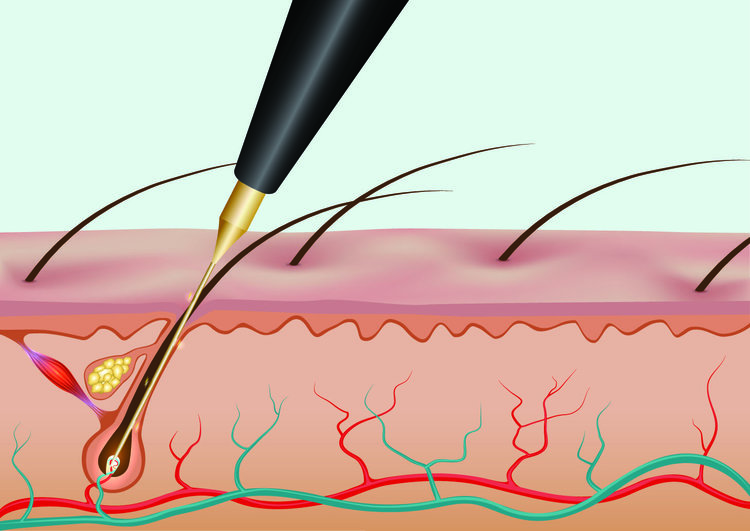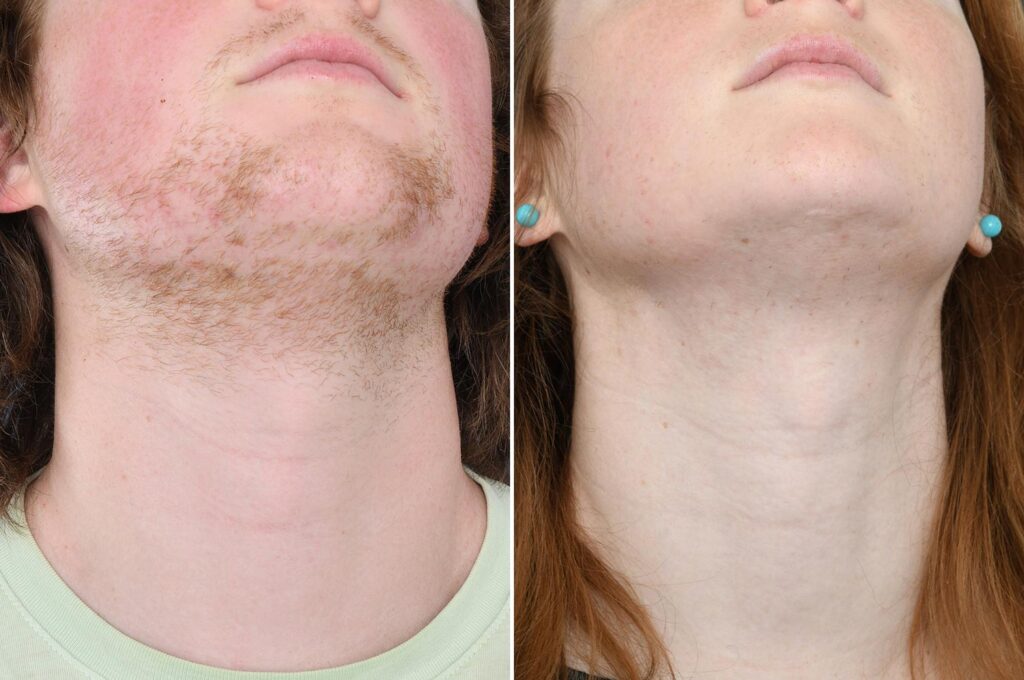
Electrolysis Before and After PCOS: PCOS can cause a variety of undesirable side effects. The overproduction of male hormones called androgens is the cause for excessive hair growth. There are many ways to control excessive hair growth. However, electrolysis has gained popularity over the past few years. We will explore electrolysis in this article.
What Is Electrolysis?
It is an effective method for hair removal. An electric current destroys hair follicles, which prevents new hair from growing. The method is highly efficient and can last for a very long time.
How does electrolysis work?

https://www.welcometoidea.com/electrolysisIn electrolysis, the hair follicle is punctured with a tiny needle. A small needle is inserted into the hair follicle and an electric current delivered, damaging the cells that are responsible for the growth of the hair. The follicle can no longer grow hair once it has been destroyed.
Does electrolysis work for PCOS?

Yes, it is possible to remove unwanted hair from PCOS with electrolysis [ 1]. Electrolysis has been reported to be effective by many women who have PCOS, especially on the upper lip and chin. It can also work well for areas like the back, chest/shoulders, legs/thighs, butt, abdomen, and butt.
The electrolysis process involves delivering a current of electricity to the hair-follicle. This destroys it and stops hair growth. The process can be painful and lengthy, but can produce more permanent results compared to other methods of hair removal like waxing or shaving [ 2]. It may require several sessions for the best results.
Other hair removal techniques can also be used to treat PCOS. These include laser hair removal, intense pulsed-light (IPL), and IPL therapy. [3]. They can provide permanent hair removal, but work by targeting pigments in the hair-follicle. This may not work for every hair type or skin tone.
Why is Electrolysis a Good Choice for PCOS-related Hair Growth?
PCOS causes an excess of male hormones called androgens. This leads to excessive hair on areas like the upper lip, chin, chest and abdomen. There are many ways to reduce excess hair, but electrolysis works well for most skin types and is long-lasting.
Benefits of Electrolysis:
Long-Term Solutions
Electrolysis is a permanent solution to unwanted hair, unlike other methods. If you take care of the area, it can be hairless for a long time.The PCOS Awareness Association states that electrolysis is an effective permanent hair removal method.
Reduce anxiety and depression
This procedure may help reduce the visibility of unwanted hair in people who have PCOS. It may improve the body image of a PCOS sufferer, reducing or preventing depression.
A study conducted in 2019 by (Trusted Source) on transgender women found that hair removal improved and prevented depressive and anxiety symptoms as well as other types of distress caused by unwanted hair.
Another study, though this may not directly apply to PCOS sufferers, noted that body image is linked with depression.
Researchers noted in the 2021 studyTrustedSource that depressive symptoms and negative body image have a two-way relationship. Researchers note that poor body image may negatively impact depressive symptoms.
Suitable For All Hair Types
All hair types can be treated by electrolysis, no matter what their color or texture. Women with PCOS, who have coarse or thick hair may find it ideal.
Enhances self-confidence
PCOS, especially when unwanted hair grows can be emotionally distressing. The permanent nature of electrolysis can improve self-esteem and well-being.
Precise
The electrolysis procedure is precise and targets each hair follicle. It is a safe procedure for areas with sensitive skin, as it does not affect the surrounding area.
Electrolysis vs laser hair removal pcos
| Laser Hair Removal | Electrolysis | |
| Definition | Uses a laser to target and damage hair follicles to prevent future hair growth. | Uses an electric current to destroy hair follicles one at a time. |
| Skin and Hair Types | Most effective on light skin and dark hair, but works on all skin and hair types.[1] | Works on all skin and hair types.[1] |
| Treatment Time | Quick and can treat large areas at once. [[1]] | Time-consuming and can only treat small areas at a time. [[1]] |
| Results | Permanent hair reduction after multiple sessions.[3] | Permanent hair removal after multiple sessions.[3] |
| Pain | Can be uncomfortable, but tolerable with topical anesthetics.[4] | Can be painful and uncomfortable.[4] |
| Cost | Can be expensive and requires multiple sessions. The average cost of laser hair removal in 2020 was $389 per session.[5] | Can also be expensive and requires multiple sessions. The cost ranges from $30 to $200 per session.[5] |
| Benefits | Quick and effective for treating large areas of unwanted hair. Can provide permanent hair reduction. | Works on all skin and hair types. Can provide permanent hair removal. |
| Drawbacks | Can be expensive and uncomfortable. Not effective on blonde, red, or gray hair. | Time-consuming and can be painful. Can cause scarring, hyperpigmentation, and ingrown hairs. |
Preparing for Electrolysis Treatment
Prepare yourself for the electrolysis procedure.
- It is important to refrain from threading, plucking and waxing in the treated area at least for a week. The hair must be in the follicle for electrolysis to work.[1]
- Sun exposure or tanning bed use should be avoided for atleast a week before the treatment. These can increase your skin’s sensitivity.
- The day of the visit you should avoid all stimulants and caffeine. But, if it is a painful visit, then ibuprofen can be taken an hour or so before.
- Certain topical products can be applied if you have been given the green light by your electrologist to help numb skin and relieve discomfort. Before you start applying any creams, ask first.
During Electrolysis Treatment
The technician will insert the small needle into the hair follicles using an electric current. The treatment may cause a mild tingling sensation or even stinging, but for most people it is painless. Each treatment will last 15 to 60 minutes depending on the size and location of the treated area.
After Electrolysis Treatment
It is normal to experience redness, swelling or scabbing after an electrolysis procedure. Normal and it should disappear within a week.
- In order to prevent infections, you should avoid touching the treated area. Keep it clean and dry.
- You will be given instructions by your electrologist before you leave or even prior to the visit, so that you are aware of what you can expect.
- The aesthetician may advise you to avoid the sun and use sunscreen whenever you go outdoors.[2]
- She/He might give you an antibacterial cream or hydrocortisone to use to reduce the chance of swelling or infection.[2]
Alternative option
Some people find by treating PCOS using certain medications, they can prevent hair from growing.
Some doctors may prescribe spironolactone for excessive hair growth but The FDA hasn’t approved this drug for treating PCOS, but healthcare professionals can prescribe spironolactone. This medication reduces androgen levels.
The following are some of the drawbacks to spironolactone:
- Long-term usage is not known to be harmful.
- You should not use it during pregnancy.
- The number of hairs does not change, but the hair will become thinner and more noticeable.
Results of Electrolysis Treatment for PCOS-related Hair Growth
Results of PCOS electrolysis treatments can differ depending on factors such as size, density and individual hormone levels. Most people, however, will notice a reduction in their hair growth within 1-2 treatments. The results of electrolysis are not always immediate. Multiple treatments might be required to reach the desired result.

Possible Side Effects of Electrolysis
Although electrolysis has a good track record of being a treatment that is safe, it can cause some unwanted side effects. They can include swelling, redness and discoloration of the skin. Rarely, electrolysis could cause infections or scarring. The side effects of electrolysis are very rare. They can, however be minimised by using a skilled and qualified technician.
Does insurance cover electrolysis for pcos?
The hair removal procedure of electrolysis can help treat PCOS-related hair problems. Insurance coverage may vary depending on whether electrolysis is considered medical or not.
If a doctor deems it medically necessary, some insurance plans will cover PCOS electrolysis. Other insurance plans, however, may view electrolysis as a cosmetic treatment and not cover it.
It is best to speak directly with the insurer and ask about the coverage of electrolysis for PCOS. A healthcare provider can also provide information on the insurance coverage of electrolysis to treat PCOS.
Note that the coverage requirements and policies can differ greatly among insurance companies and plans, even within a single provider. It is therefore important to review the insurance policy documents and speak with providers to understand coverage options as well as potential costs. [1]
Conclusion
Electrolysis can be a very effective solution to unwanted hair. It is especially useful for women experiencing hair growth due to PCOS. You can decide if electrolysis will work for you by knowing what to expect prior, during, or after the procedure. You should choose an experienced and qualified technician if you are interested in electrolysis.
YOU MAY ALSO LIKE:
Does laser hair removal help if you have pcos?
Is PCOS an Autoimmune Disease?
Black period blood PCOS “Is Black Period Blood Normal?
